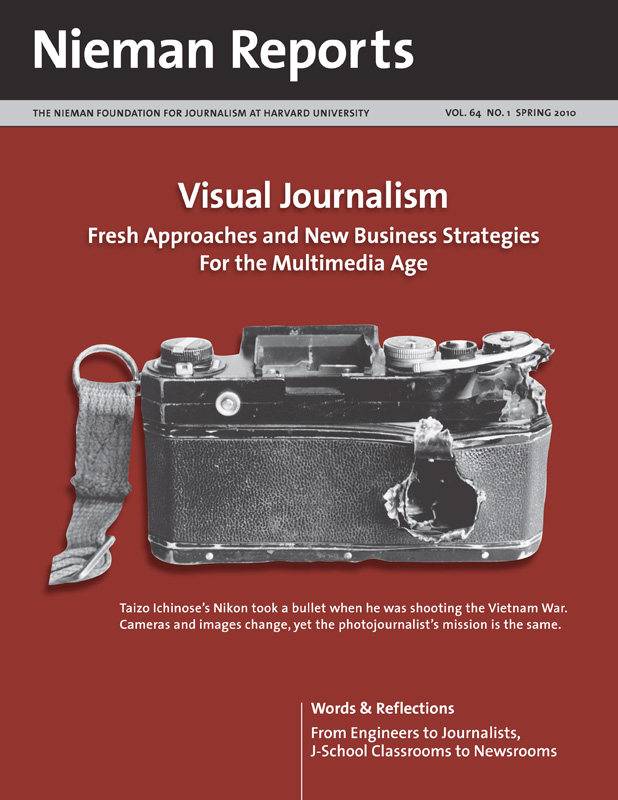
James Reynolds, NF ’10, moderates a teleconference between journalists in Afghanistan and the 2010 Nieman Fellows. Photo by Melissa Ludtke.
The news from Afghanistan came toward the start of our Nieman class’s deliberations about naming a recipient of the Louis M. Lyons Award for Conscience and Integrity in Journalism. On September 5, 2009, two journalists from The New York Times—Stephen Farrell from Britain and Sultan Munadi from Afghanistan—were kidnapped by the Taliban in northern Afghanistan. Four days later, British forces raided the compound in which the two men were being held. Farrell was rescued safely but Munadi was killed.
At the sound of approaching helicopters on the day of the raid, Farrell, Munadi and their captors ran out of the building. “[Munadi] carried straight on beyond the corner of the wall, bringing him out into the open,’’ Farrell wrote in his account of the raid. “Wearing the same pale salwar kameez he had worn for four days he raised his hands and shouted, ‘Journaliste, journaliste,’ even as he stepped out. It was accented, in exactly the same way he had used 1,000 times in four days talking to the Taliban … There was a burst of gunfire and he went down immediately.’’’
In the aftermath of Munadi’s death, journalists in Afghanistan spoke of their anger at what they saw as a clear double standard—the life of a foreign journalist was worth more than that of an Afghan journalist.
“There was a kind of proud [TV] coverage of Stephen being released,’’ Afghan journalist Barry Salaam told the BBC World Service, “but then there were subtitles reading that the interpreter was killed … giving one life a big value and, that life that’s been lost, you’re simply downplaying it so that people don’t know that he was an important person to us, to the journalist community.’’’
“You’re not a Western [citizen], there’s not a whole government, a whole nation behind you as a citizen whose life is important,’’ Salaam said in that interview, “and so we act and take all the risks individually.’’
It struck our class that with the Lyons award we had a clear opportunity to address these points—to communicate to Afghan journalists our appreciation for their work and to assert that the lives of all journalists should be valued equally. The award, named for a past curator of the Nieman Foundation, honors displays of conscience and integrity in journalism.
In addition to paying tribute to our colleagues in Afghanistan, we also RELATED ARTICLE
“Slain Sri Lankan Journalist Honored for His Commitment to a Free Press”decided to honor the slain husband of one of our classmates. So we named two recipients, the journalists of Afghanistan and Lasantha Wickrematunge, the founder and editor in chief of the Sunday Leader in Colombo, Sri Lanka.
After conducting research to determine the best recipient for the prize money in Afghanistan, we decided on the Frontline Club Fixers’ Fund, which will provide direct financial support to the families of Afghan journalists killed on the job. The class matched the $1,000 award money provided by the Nieman Foundation.
We also discussed ways in which we might engage with our colleagues in Kabul. We wanted to learn more about the challenges they face and other ways that we might help their cause. Martha Bebinger, NF ’10, and Ibrahim Barzaq, NF ’10, joined me in organizing a teleconference with Kabul. The Carr Center for Human Rights Policy at the Harvard Kennedy School put us in touch with the Institute for War & Peace Reporting, which hosted a gathering in Kabul of Afghan journalists for the teleconference. Ibrahim spoke daily at 5 a.m. to his contacts in Kabul to arrange the technical side of the event. (Our plans were rattled the day before the event when U.S. forces arrested our intended cameraman in Kabul. We improvised an alternative. The cameraman was later released.)
On the morning of November 16, we invited Nieman Fellows and staff to gather in the seminar room to take part in our Skype hookup with Kabul. (In my day job as a TV reporter, I’ve been involved in a few ambitious technical hookups—none was as nerve-racking as this.) Kevin Sites, NF ’10, stood by with his video camera to record the exchange. Suddenly Kabul came up onto the screen. Twenty or so of us at the Lippmann House found ourselves looking at a similar number of colleagues gathered in a room in the Afghan capital.
For the next hour, we listened to our Afghan counterparts. Out of respect for their security, we have withheld their names.
“We Afghan journalists are facing a very critical situation, we are facing threats from the Taliban, from warlords,’’ one journalist told us.
“Can you explain to us exactly what that means?’’ asked Lisa Mullins, NF ’10.
“There is no way for us to protect ourselves in Helmand when we face threats to begin with,” the journalist replied, “We have recordings of phone calls from the Taliban who have threatened us with our lives.’’
“Can you give us some advice when it comes to working with Afghan journalists on the ground?’’ asked Monica Campbell, NF ’10.
“All Afghan journalists are unhappy with the behavior of foreign journalists in Afghanistan,’’ one of the journalists told us, “We have several cases that you know of. In these cases the Afghan journalist was killed, but the foreign journalist was released.’’
The hookup concluded with this thought from Kabul:
“Thank you for remembering Afghan journalists and especially for granting this award to Afghan journalists this year. The world only hears about the sacrifices of Afghan journalists when they are killed. But there are many others who can’t live in their own homes—are forced to leave their homes to protect their lives and their only sin is their work.
At the Lyons dinner the next evening, we played an excerpt from this teleconference, to bring the concerns of the Afghan journalists to everyone in the room. Afghan journalist Abdul Waheed Wafa of The New York Times accepted the Lyons award on behalf of his colleagues and in honor of his slain friend, Sultan Munadi. In handing the award to Wafa, I spoke on behalf of the Nieman Class of 2010, noting that the Lyons award had never before gone to an Afgh
an journalist.
Since that night, two plaques have been added to those on the Lyons award wall at the Lippmann House. One honors Lasantha Wickrematunge. The other reads: “2010 – Journalists of Afghanistan – For their bravery in delivering the news from one of the most dangerous reporting environments in the world.’’
James Reynolds, a 2010 Nieman Fellow, is a correspondent for BBC News.



